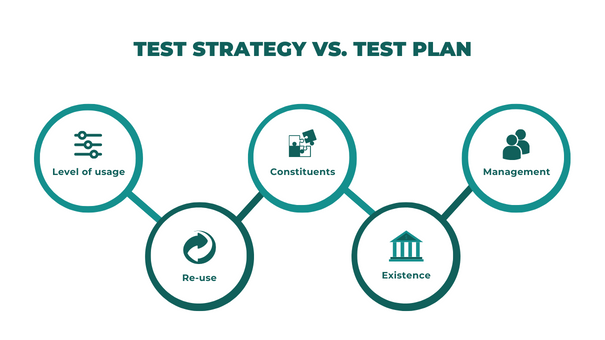
Across several technology teams, the test strategy vs. test plan debate is becoming a major challenge. As more businesses drive their key growth via digital channels, ensuring that applications exhibit the highest quality standards is of prime importance.
To that end, enterprise tech leaders must thoroughly know the facts in the test strategy vs. test plan debate. In short, they must clearly distinguish between test plans and strategies at all levels.
However, if the business's core area of focus is non-tech, it's likely that testing strategies will not be of high priority from a leadership standpoint. As a result, the difference between test plan and test strategy will not be effectively propagated amongst teams. Eventually, it'll result in more challenges.
In this blog, we will cover:

Why is it important to resolve the test strategy vs. test plan debate?
The very definition of test plan and test strategy is the primary reason all stakeholders must be fully aware of their differences. Let us consider both as documents to have a clearer definition.
A test plan is a formalized and focused document prepared from the SRS document that outlines the areas to be tested (scope) and the different activities to be done while testing. An enterprise will create the test plan for every software development project it undertakes.
On the other hand, a test strategy is a high-level guidance document that lays out the approach that an organization must take in any test activity. It focuses on best practices and essential traits of any software that must be evaluated with respect to organizational objectives.
In addition, the test strategy document encompasses information such as the following:
- Type of testing to be followed for different scenarios
- Tools to be used
- Test environment configuration practices
- Release control practices
- Risk mitigation procedures
- Roles and responsibility assignment practices, and much more.
A test plan needs to derive its content from the test strategy. This is the fundamental difference between the two. Based on a project, the test manager can prepare the test plan and assign roles and responsibilities to different people based on guidance from the test strategy principles.
Unless the test plan follows the guidelines laid out in the test strategy document, there's a high probability it can compromise the enterprise's ambitions.
SUGGESTED READ - What is Mobile testing? The perfect approach
What are the key differences between a test plan and a test strategy?

If developers, test engineers, and other stakeholders do not have clarity on the difference between a test plan and a test strategy, there could be serious repercussions.
To enable decision-makers to make more informed choices, let us explore the five major differences between test plan and test strategy:
Level of usage
An enterprise defines the test plan at a project level. Whenever they plan a new feature addition/upgrade for the application, they consider the initiative as a project — accordingly preparing the test plan.
Contrarily, a test strategy is prepared at an organizational level. It serves as an umbrella document that sets the foundation for every project to build its individual test plan on top of it.
Re-use
An enterprise very rarely uses a test plan, given its preparation for every individual project. They can re-use some parts or ideas but using the exact replica of a test plan is not advisable.
A test strategy is a long-term document. Enterprises use it across multiple projects at the same time. In fact, it can be re-used any number of times until the organization conducts an audit and determines the necessary changes.
Constituents
A test plan contains the following:
- Test plan ID
- List of features of the application that needs testing
- To-follow technique or test approach for each component
- Test automation tool to use
- Pass or failure criterion, roles, schedules, and more project-specific data.
Comparatively, the test strategy document contains a generic roadmap of the following:
- Testing type for each scenario
- Test processes in the organization
- Objectives to track during any test activity and more generic control statements.
Management
The test manager or test lead in a project prepares and manages the test plan. They take notes from the test strategy and design the most tailor-made test plan for every project.
However, the test strategy requires inputs from project managers or product managers and other senior technology and business leaders in the enterprise. It outlines the overall quality objective that must be followed for every development activity. Hence, typically, senior-level leaders or product/project managers prepare it.
Existence
In essence, a test plan has an independent existence in every project. Since it describes what actions to do and who will do them, it has a prime focus and individual existence.
On the contrary, the test strategy is often a part of the test plan. It has existed from an organizational strategy point of view and is the foundation for defining end-to-end testing practices.
However, from a test focus, the test strategy doesn't have individual existence. Multiple projects leverage it based on their unique test plans at different times.
How can enterprises leverage maximum ROI from their testing strategies?
We have covered the critical aspects of the test strategy vs. test plan debate. Now that the significant differences are apparent, enterprises must focus on achieving maximum ROI from their test initiatives.
In sum, they must prepare and execute a testing roadmap that follows the test plan while at the same time adhering to the organizational test strategy.
But, to achieve this, enterprises need to incorporate end-to-end automation testing to help streamline testing efforts without bias.
ACCELQ's end-to-end test automation platform empowers your teams to seamlessly manage all their testing activities. With zero-coding and end-to-end business process assurance, it becomes easier for software teams to be compliant with the organization's test strategy and prepare the most efficient test plan.
Book a free trial to explore more about us.


































